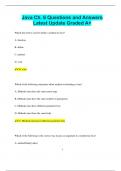Exam (elaborations)
Java Ch. 6 Questions and Answers Latest Update Graded A+
- Course
- Institution
Java Ch. 6 Questions and Answers Latest Update Graded A+ Which keyword is used to define a method in Java? A. function B. define C. method D. void D. void Which of the following statements about method overloading is true? A. Methods must have the same return type B. Methods mu...
[Show more]



